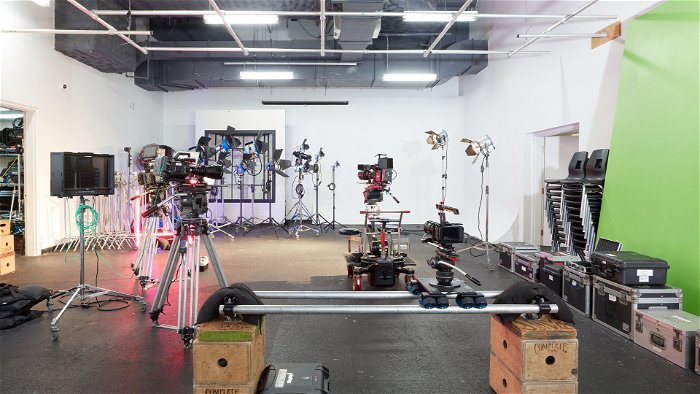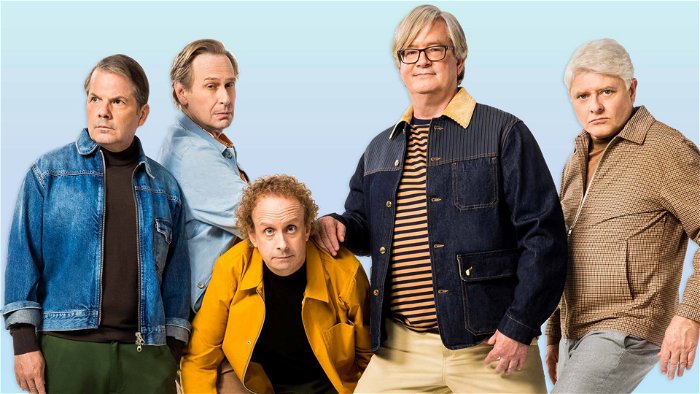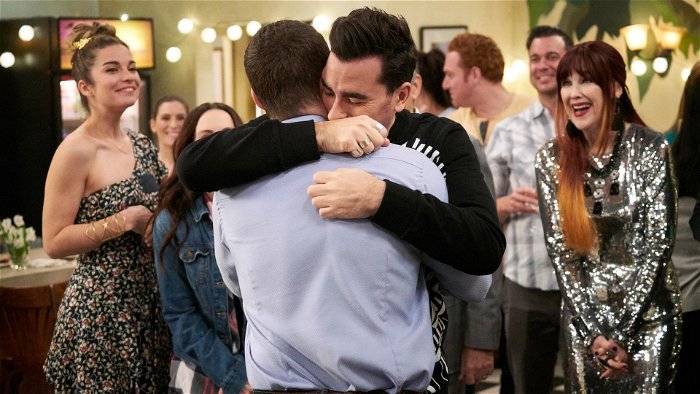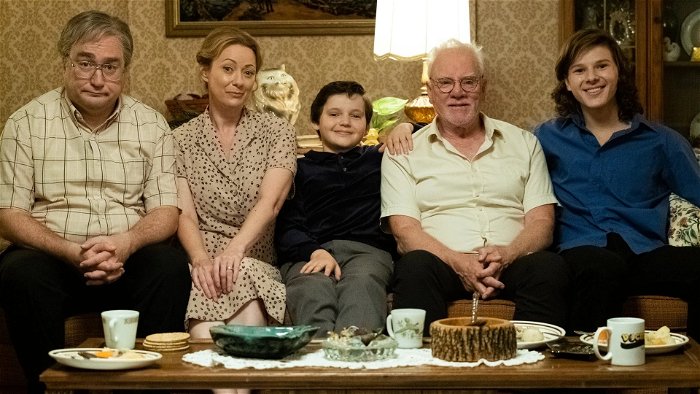CGMagazine spoke with award-winning Canadian executive producer Andrew Barnsley on the Canadian TV/film industry and its potential future.
Behind every great film or TV production, there is always someone out there who has to pitch the most ridiculous ideas before they can be made. Whether it is Kevin Feige trying to convince backers that Robert Downey Jr. can be Iron Man or Jon Favreau trying to pitch a Star Wars Disney+ show, every film/TV project requires great executive producers to make the ideas come to life. For the Canadian film and television industry, we have Andrew Barnsley.
Who is that, you may be asking? Barnsley, alongside Ben Feigin, Dan and Eugene Levy, was able to provide the world with six knee-slapping, hilarious seasons of Schitt’s Creek. This humbly-produced show went on to win multiple Emmys, Golden Globes and Canadian Screen Awards. What began as a humble satirical sitcom on the was-rich Rose family on CBC, it became a home staple for laughs and heartwarming moments to many friends and families—especially when the licensing was bought by Netflix to stream the show.
Barnsley himself is an Emmy, Golden Globe, and a six-time Canadian Screen Award winner—making him one of the biggest Canadian success stories in the entertainment industry on the international stage and for Canadian TV. With much acclaim, accolades and hard work, he has also been recently named the president of the Toronto Film School. Much of this conversation was spurred on by MovieMaker Magazine naming Toronto as one of the best places to live and work as a moviemaker.

We discussed with Barnsley what shows like Schitt’s Creek and the now-trending Canadian series Son of a Critch all have in common for success at the global level. Also, we talked about how much Toronto has grown as an entertainment hub for film and television. Barnsley also discussed the important work being done at the Toronto Film School.
Growing up in Toronto, it only hit me how much Toronto has been used as a backdrop in so many films when I saw movies like Resident Evil: Apocalypse, Mean Girls or Scott Pilgrim Vs. The World. Hearing how MovieMaker Magazine called Toronto “Hollywood North,” I am curious how someone in your position pitches to studios and networks about how Canadian cities like Toronto would be useful to the film and TV industry as a whole—especially since it is frequently cold here.
Andrew Barnsley: So it’s like, “How does a Hollywood studio decide that they want to film their productions and invest in Toronto?” And it’s kind of what you’re saying, Toronto has transformed in recent years, and I’ve been in this business for about 20 years now. The kind of transformation that the industry in this city has gone through over that time is remarkable. It’s really unrecognizable. A big enormous part of that is that Toronto has become a destination for production, a global destination for production. And to accomplish that, it’s not luck. It’s hard to work. It’s all stakeholders coming together to figure out how to make Toronto a destination for the industry.
And when I talk about all stakeholders, it’s all three levels of government: it’s private investors, it’s producers, it’s unions, it’s actors, writers and directors. Also, it’s about investing in location libraries, and it’s all about investing in a film office. So it’s all of these pieces that need to come together to create an environment that is welcoming and attractive for the industry. Stakeholders also include schools in all this. All of these pieces need to be working together to create an environment that makes a lot of sense.
I’ve spent a lot of time in Los Angeles speaking with studios about this exactly, and they refer to it as jurisdiction shopping. So when they make a decision of going to greenlight a movie, whether it’s a $5 million movie or a $200 million movie, the creative execs and the studio heads decide if they’re going to make it. Then, they hand it off to their physical production team to figure out how to make it. And that’s when they look at things like a jurisdiction as such in Toronto.
“Last year, there were about 1500 productions filmed here; it’s an industry that employs 35,000 Torontonians. And this is all growing. “
What they’ll do is they’ll look at what are the financial benefits of going there? And look at tax credit systems that are in place. Are they reliable? Can we count on this? Is the government support at the federal level? Is there government support at the provincial level? That’s one thing.
Then they look at the physical infrastructure of where it needs to be, are there soundstages? Can we get the cameras that we need? Can we get the grip and equipment that we need, then the next big pieces are labour. Are there people there who can actually execute the vision that they have? And this is why you can’t just flip a switch and have all this stuff up here.
It took decades of work to get where we are right now in Toronto. We are now seeing the fruits of all this hard work and a shared vision, and support from all stakeholders coming together. Toronto is now seen as one of the production hubs and production destinations globally. And I can say that with pride: I’m a producer here. I’m also the president of Toronto Film School.

In both of those capacities, I really take a lot of responsibility in terms of where I fit into the film and television production ecosystem. How do I help elevate it as a Torontonian? And as a Canadian? And when it comes to productions, it’s how do we make sure that we’re hiring locally? How do we make sure that we’re elevating and finding new talent? And then, on the school side, how do you make sure that as the industry grows? We’re making sure that there’s a skilled workforce there to address the production demands.
So it’s all these pieces that have to come together. The stakeholders in Toronto have really bought into and embraced a vision for where we want to go. They have also recognized that it’s become an enormous economic engine in the city of Toronto. Last year, there were about 1500 productions filmed here; it’s an industry that employs 35,000 Torontonians. And this is all growing.
It’s a very meaningful and important piece of the economy. And like what you’re saying, we can also take pride when we see ourselves and our city on screen. It’s pretty cool, and we’ve come a long way, but I think there’s a long way to go. It feels like we’re doing so many of the right things, and we’re seeing these large studios choosing Toronto and choosing to invest in Toronto.
Oh, wow! 1500 productions! I know you previously talked about working in comedy and enjoying comedy for a long time. How has that translated into your role as an executive producer and now with Toronto Film School?
Andrew Barnsley: I was really drawn like anybody in their early adulthood, trying to navigate the world, what you want to do, and what your options are. From a young teenager, I was just always a big fan of comedy. It was something that I really enjoyed, and I felt connected to as a consumer of comedy. Then, as I aged and started going to school, that passion evolved. I wanted to figure out a way to explore a career in that.
I was never interested in being on stage or in being a writer, but I was interested in supporting it and finding ways to bring comedy to people. I feel there’s incredible importance and value around comedy, not just in terms of bringing laughter to the world. But you can also start meaningful cultural conversations in very palatable ways. Comedy is a very important device for doing that, and it’s historically accurate if you study comedy and literature or comedy and theatre. I felt a real passion for them.
I built a career of figuring out how to connect business to comedy and television. In doing that, I learned about producing. Then as my career in producing grew, I was exposed to bigger industry issues and industry pressures. All of this evolved, and I became a meaningful industry stakeholder and presence, which I take very seriously.

One of the things in producing shows and comedies is you realize the importance of finding talents and finding voices. But when it comes to the execution on the production side, you need the right people in place. What I’ve discovered as a producer is that in a lot of instances, there’s been labour shortages and gaps in very important production roles.
Being at Toronto Film School, it’s like I can wear these two hats. They support each other. It’s where I can identify where there are pain points in the industry connected to skilled labour and figure out how to hopefully solve some of those problem problems and challenges with fellow stakeholders. So, all of these things are connected. And it all really comes back to my passion for comedy, which goes back 25-30 years now.
Since you watched a lot of comedies growing up, what were some of the comedy shows that inspired you?
Oh, I really liked sitcoms growing up. I like the pace of jokes. I like jokes a lot! And then from that, I got interested in sketch comedy. So Saturday Night Live was something that I really liked growing up. SCTV had a huge influence on me. Kids in the Hall had a huge influence on me. CODCO, which was a Newfoundland-based sketch comedy troupe that had a presence on CBC, had a huge influence on me. And then I started to really get interested in stand-up comedy as well.
So, I just love jokes. I love the power of jokes. I love how they can move cultural needles. And you look at a sketch comedy, which parody and satire fall into it. You’re able to really comment on it. You’re able to comment on cultural things that can be a bit sensitive, like politics and various things. I’d love that. Kids in the Hall was one that really blew my mind because if you look at it and you go back, the original stuff was activist comedy.
They really had a lot to say. And they wanted to be punk rock about some of their opinions. And they did it in ways that made you laugh. There’s a lot of power in that. So those are the comedies and the genres that got me excited about pursuing comedy.

Yes! I really like comedies that are able to balance politics and comedy, too. The drama and jokes. It’s really shown itself in shows like Kim’s Convenience and Schitt’s Creek. Thanks again for Schitt’s Creek by the way, that has to be your bread and butter!
Andrew Barnsley: Thank you. Yeah, you’re right. One of the things the global marketplace has learned is, and I think it’s kind of shifted, how comedies are produced and tackled. Sitcoms never really travelled. A Hollywood or North American sitcom would be a huge hit here, but it couldn’t find an international audience. And the reason for that is that sitcoms tend to be measured by jokes per page, and the laugh track and all of that. The problem with so many sitcoms was they were very joke-forward. It was about getting as many jokes out as possible, which to me, I loved.
But in terms of finding an international audience, comedy and jokes don’t necessarily travel—they’re very culturally specific. So they’ll work in one territory and may not work in another. With Schitt’s Creek, we had a hard time selling it internationally. At the beginning, there was this feeling that comedy didn’t travel. But what you discover is if you become a comedy that’s not joke first and it’s character and story first, you have people buying into it. It’s where the comedy comes from character and story rather than from jokes.
And that’s been the trend in comedy right now. It’s hard to find multicam sitcoms that land audiences. Nowadays, it’s really this shift towards scripted character-driven comedies. And I think that’s great. I really appreciate that. I do have a soft spot for multicam sitcoms, but at the same time, I feel comedy on television has evolved in very good ways.

So you’ve talked a lot about reaching international markets there. Streaming platforms like Netflix, HBO Max, Prime Video, Apple TV+ and Disney+ have really hit those strides. Have those been the most effective ways of reaching international markets?
Andrew Barnsley: Yeah, I think so. People are willing to try new things. Not only are people discovering comedies they may not have discovered before, but culturally and language. Those barriers have come down in ways that people just want good shows, and they want to invest in shows. A perfect and easy example, of course, is Squid Game, which was massive on a global scale. It was South Korean, and nobody would have ever predicted it had the run it did—but the world found it.
There was a time when the format business was really big, where studios would go after formats. And they would find an American version of The Office, or they’d find an American version of whatever. It could go both ways. But now, that’s not necessarily the case. North American audiences will find shows that they like regardless of country of origin and language.

Switching gears, what has been the coolest moment working on a project where you are like, “This is working. This is awesome”?
Andrew Barnsley: Schitt’s Creek is certainly at the top of that list. Anytime you work, you work hard. I think how I’ll answer that are kind of these pinch-me moments where it’s like, “Oh, my God, I’m here working with people who were my idols when I was a teenager in my 20s.” Working closely with the past of Kids in the Hall, Broadway Video as a production partner, and with Eugene [Levy], Catherine [O’Hara] and Chris Elliott. These are all incredible moments where you realize if you have a vision, you have passion, and you work hard, you invest the time into it, these opportunities can reveal themselves to you.
It’s very humbling and exciting to be in those moments where you’re like, “How did this all happen? How did I find myself here?” It’s pretty awesome; those moments are rare. When they do happen, I really want to take the time to appreciate them and let them sit and sink in and reflect on all the hard work that it took to get there. And I’ve been lucky to have a few of them.
So, as someone who is the recipient of an Emmy, a Golden Globe, and a six-time Canadian Screen Award winner, what advice do you typically have for students and budding young graduates at Toronto Film School?
Andrew Barnsley: First of all, it’s a big growing industry, and there are real careers that are high paying and can have real growth trajectories to them. So it’s hoping to create some confidence in the industry that they’re going into and the cultural industries. These are big economic engines that people are getting hired and there’s a constant demand. That’s one thing.
The other thing is I think it’s important to follow your passion and find your passion. Follow your passion, and create a plan of where you want to go and how you want to get there. If you’re choosing to be a creative leader, those pathways aren’t easy. You need to surround yourself with the right people, build out a professional network and stay focused. Work ethic is key. I think it’s important to have a sense of where you want to go, and then it’s up to you to figure out what the steps are to get there and stay committed to it.
One of the things that I stuck with when I was building my career, and much to my parents, was that I didn’t have a plan B. I told myself I was going to figure this out. And I was just so committed to it. I went to school for a long time to build the skills that I needed; education is very important. But I also spent a lot of time meeting people in the industry and finding mentors to learn from—not having an ego about it, just willing to learn, make mistakes, take risks, and really stay focused. All of these things…there’s no shortcut. That’s sort of the biggest thing.

Lastly, were there any special projects or productions you wanted to shout out and recognize that you have been working on recently?
Andrew Barnsley: Son of a Critch, I’m so proud of that show. It’s really been one driven by the talent and voice of Mark Critch and co-creator Tim McAuliffe. [They] have tapped into something so beautiful about coming-of-age and growing up, and done with the backdrop of 1980s Newfoundland. My mom’s from Newfoundland; I have a lot of family. So, there’s a real personal connection to it, and I take great pride in what this show has accomplished.
And I hope you watch it, I hope lots of people continue to check it out. We have lots of stuff on our development slate; there’s more to come. But right now, I’m really focused on making sure that show gets watched. Also, as a sort of parting words to young people who are just thinking about their careers and wondering if there’s a career in the cultural industries for them.
I just think it’s so important for them to just look at the numbers, look at the industry and realize this is real. This is important, and it’s meaningful. There are careers out there where you can explore your passion and be a part of storytelling and bringing stories and voices from Canada to the world. It’s just a very exciting and interesting time to be considering a career in the cultural industries.

There’s no time like the present to pick up a new career! Thank you again so much, Andrew!
Andrew Barnsley: Nice to meet you, and thank you for the conversation.




